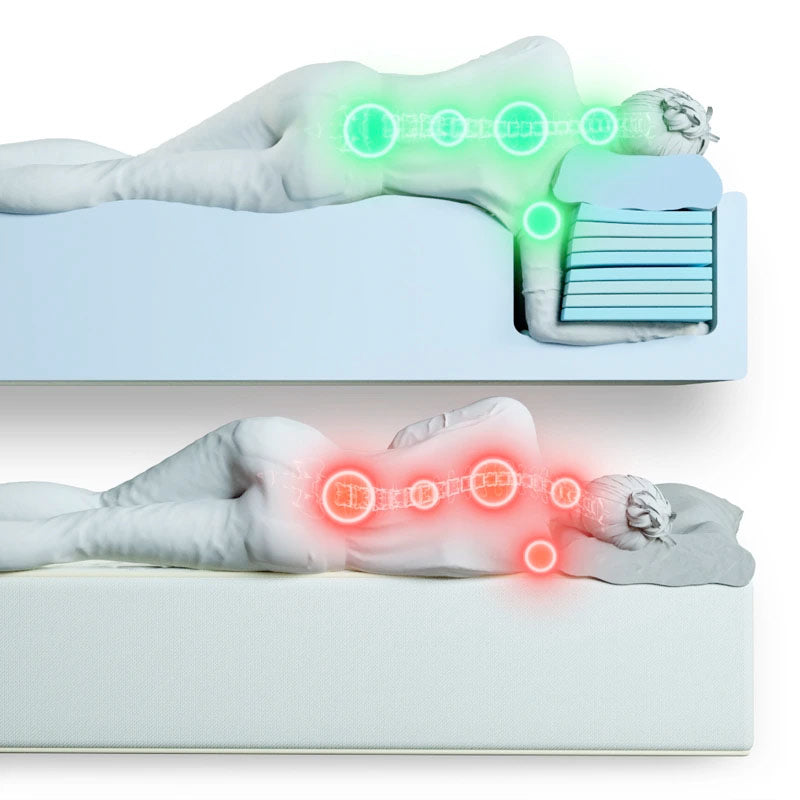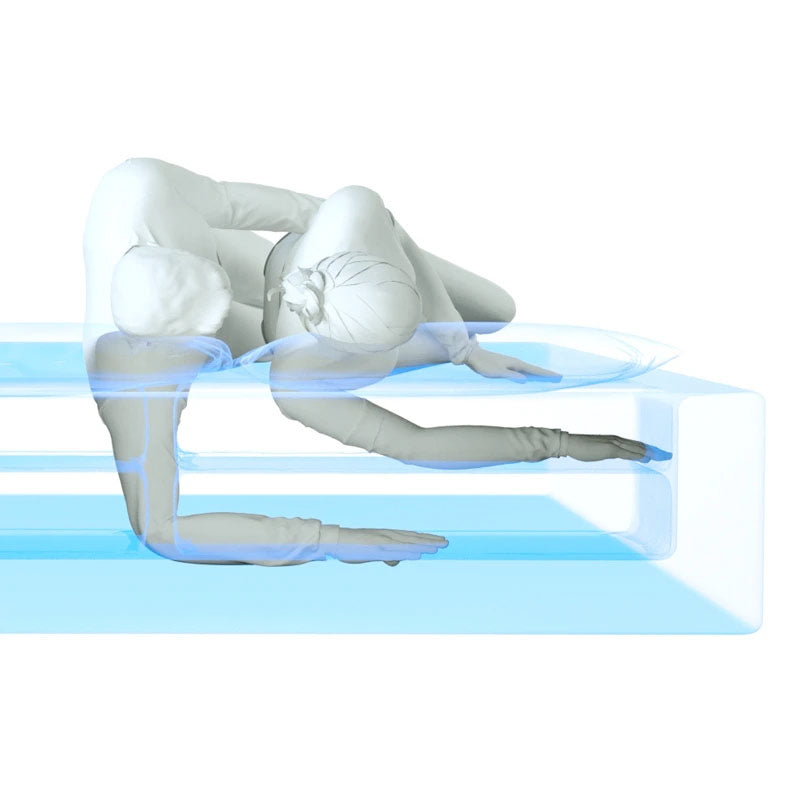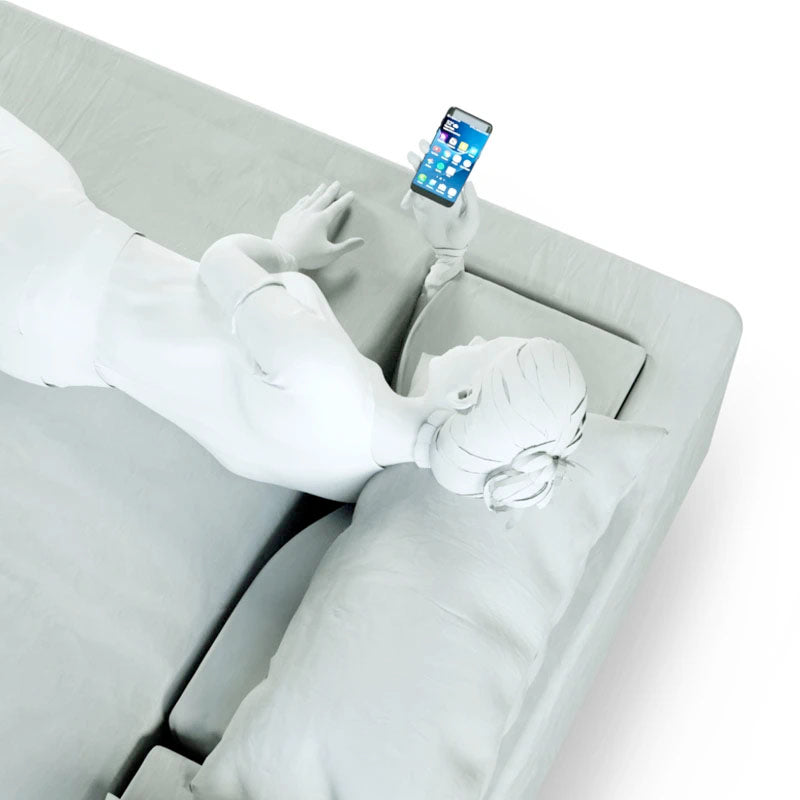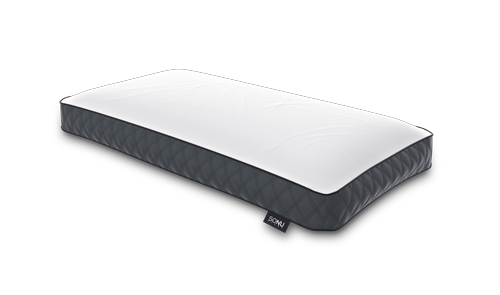If you suffer from digestive issues, you know how uncomfortable sleeping can be. Some positions can make your digestive discomfort even worse, but others can help ease the pain. Most experts recommend that you lie on your side for digestive issues, but which side is best?
That’s what we’re going to find out today, along with other important information you should make note of about digestion and sleep.
If you aren’t sleeping on a good mattress and supportive pillows, you won’t be able to rest well with or without digestion discomfort.
Set yourself up for good sleep by having a supportive bed at home. If you’re in the market for a new bed, try SONU Sleep’s negative space mattress with built-in adjustable Support Pillows.
How Are Digestion and Sleep Related?
Getting enough sleep is one of the best things you can do to have a healthy gut. When you are sleep-deprived, you are slower, you crave food that’s high in fat and sugar, and you are prone to inflammation. This can result in gastro issues like gas, constipation, and bloating.
In fact, disrupted sleep is often the first sign that you might have a digestive issue. People who eat poor diets and have chronic digestion problems sleep less than their peers.
The health and wellbeing of 70 million Americans have been affected by their chronic sleep disorders. People who experience sleep disturbances are often sufferers of gastro issues like GERD and peptic disease.
Circadian rhythm and our metabolic processes influence each other. If one is off, the other is likely off-kilter as well. People who consistently lose sleep sometimes have irregular eating habits, like eating primary meals later than normal.
When we sleep, our digestive actions slow down or reduce. This includes swallowing, saliva production, sphincter pressure of the upper esophagus, and esophageal contractions. The decrease in esophageal contractions often leads to GERD.
Gastric emptying, the action of food moving out of the stomach, also slows down when we do not get rapid eye movement (REM) sleep. If we were to get REM sleep, gastric emptying would go much faster.
When we sleep, our colons contract less than they would when we are awake. Pressure in the anal canal is lower during sleep, but rectum contractions are higher.
What Are the Benefits of Side Sleeping?
When it comes to digestion, the side sleeping position is your best option. In addition to that, side sleeping has many other benefits.
If you snore or have sleep apnea, sleeping on your side can help keep your airways open.
People who sleep on their side may also reduce their risk of neurological diseases. Simply sleeping on your side helps remove toxins from your brain that cause those diseases.
If you experience or are at risk for heart issues, like heartburn, sleeping on your side is the healthiest for your heart. Sleeping on your side with heartburn relieves pressure from your stomach.
That said, side sleepers often experience discomfort as a result of the pressure caused by a poor quality mattress.
That’s why SONU created the innovative SONU Sleep System, featuring a negative space mattress that allows you to immerse your arm and shoulder into the bed while side sleeping.
With sink-in support, a plush layer of serene foam, and cooling technology, the SONU Sleep System will elevate your level of comfort for the best sleep of your life.
Which Sleeping Side Is Best for Digestion?
So, which side do you sleep on to relieve digestion issues? Most experts tout the left side as being the most beneficial for the digestive system because your stomach is located on your left-hand side. They believe that lying on this side will enable your intestines to process waste efficiently.
If you experience frequent stomach pain, sleeping on your left side with a pillow between your legs can help provide you with relief. Using a pillow helps you maintain your posture while you sleep, and it also takes some of the pressure off of your joints.
Lying on your left side also helps relieve gas. When you lie on this side, it helps gastric emptying occur more efficiently. If you need a little more support, grab a pillow and put it between your knees.
What Are Common Digestion Issues?
If your gastrointestinal issues have left you feeling isolated, there’s no need. In a survey of 70,000+ Americans, two out three experienced gastrointestinal symptoms.
Some of these symptoms were heartburn or acid reflux, abdominal pain, bloating, diarrhea, and constipation. Some subjects also experienced dysphagia (difficulty swallowing), incontinence, and nausea/vomiting.
Gastrointestinal issues aren’t just uncomfortable. They can lead to your death. Along with liver and pancreatic diseases, gastro issues can be attributed to approximately 236,000 deaths each year. They also incur $142 billion in annual medical costs in the United States. To say that gastro issues in America are a concern is an understatement.
Why are so many Americans experiencing gastro symptoms? It could be one thing or a combination of things, mostly pertaining to diet. The following factors can contribute to digestive issues:
- Experiencing frequent stress
- Not eating enough fiber
- Eating a lot of dairy products
- Not getting enough exercise
- Becoming pregnant
- Taking antacids
Below are some of the most common digestion issues, along with a brief explanation of each.
Acid Reflux/GERD
If you experience frequent heartburn, you may be suffering from acid reflux or gastroesophageal reflux disease (GERD). GERD causes pain in your chest and a burning or “acidic” feeling in your throat. If it isn’t treated, you risk bleeding in your esophagus or erosion of its lining.
Acid reflux and GERD are usually grouped together, but they are not exactly the same thing. Acid reflux is an issue that leads to GERD.
Acid reflux is heartburn. When the lower esophagus does not close properly, digestive contents move back up into the throat. If this happens to you on an ongoing basis, it may then diagnosed as GERD. So, think of GERD as chronic acid reflux.
Constipation
A person is considered chronically constipated if they have not produced a bowel movement more than three times in one week or during the weeks that follow.
When they do produce a bowel movement, the stools can be very painful and hard to pass, and they will come out hard in texture. Many people experience constipation when they have not consumed enough fiber or liquids.
Irritable Bowel Syndrome
Irritable bowel syndrome (IBS) occurs when the colon muscle contracts abnormally. IBS can be triggered by stress, certain foods, and medicine. People with IBS often experience a change in their bowel movements, stomach cramps, and gas.
Diverticulosis
Diverticulosis happens when small outpouchings form on the wall of your large intestine. This causes constipation. It is caused by not consuming enough fiber. If antibiotics and a change in diet do not cure diverticulosis, surgery may be required.
Diarrhea
Diarrhea is when a person has numerous loose stools within a day or more. It occurs when our bodies cannot absorb certain foods. Diarrhea is usually a symptom of another health issue, so it is wise to tell your doctor about it.
Gas
Gas is a substance that leaves your digestive tract through your mouth or anus. Gas symptoms include passing gas, burping, and bloating. If you feel like your gas symptoms are out of control, your doctor may prescribe you supplements or tell you to avoid certain food and drink.
Conclusion
Common gastrointestinal issues include acid reflux, GERD, constipation, diverticulosis, IBS, diarrhea, and gas. Many people who suffer from these disorders get inadequate sleep.
Quality of sleep and digestive health can be interdependent. If one shows up, the other is probably not far behind.
Sleeping on your left side is recommended the most for digestion since the stomach is on the left side of your body. Whether you have digestion issues or are simply trying to prevent them, you may want to revert to sleeping on your left side.
If you’re a side sleeper and this article struck a chord with you, you might be interested in trying out a new mattress designed specifically for side sleepers. The SONU Sleep System’s unique design is made of top quality, high-resilience foams, latex and serenes that feature the patented Comfort Channel and Support Pillow system, as exclusive innovation of SONU Sleep innovation.
Release your arms and shoulders from the discomfort of everyday mattresses and let them experience the immersion that only the SONU can offer.
Better sleep is waiting for you.
Sources
Burden of Gastrointestinal Symptoms in the United States: Results of a Nationally
Representative Survey of Over 71,000 Americans | NIH
The Scope Blog - 6 Common Digestive Disorders | Tanner Health System
Gastrointestinal Diseases: Symptoms, Treatment & Causes | Cleveland Clinic
Gas in the Digestive Tract | NIDDK
Five Simple Positions to Lay in to Relieve Stomach Pain | Med Alert Help
Aspects of sleep effects on the digestive tract | NIH
Acid reflux and sleep disorders: Both can be hidden | American Sleep Apnea Association





























